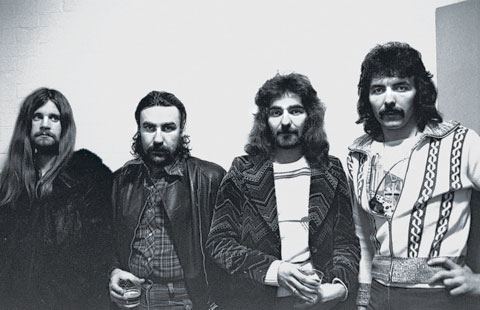
SUCCESS BLEW THEIR MINDS Ozzy’s pangs, Bill Ward’s dream-battle with the downbeat, Geezer’s visions, and Tony Iommi, whose riffs were not riffs at all — they were laws. |
The literature on Black Sabbath — already extensive — will continue to grow, as we try, try, try again to wrap our poor noggins around the irreducibly cosmic fact of this band. Listen: it's 10 seconds after the Fall of Man. The Beatific Vision recedes above us, a weakening glow — the aether whines with acceleration. And suddenly, appallingly, we have arrived. Splashdown in the welter of mortality. Madness, death, hemorrhoids. We're here! And what's that voice in our ears, that strange and cold-souled singing? Lost in the wheels of confusion/Running through valleys of tears/Eyes full of angry delusion/Hiding in everyday fears . . .So Sabbath — who appear poised, as we go to press, to announce . . . a reunion? can it be? — entered Time. Lester Bangs had them pegged in 1972: "the first Catholic rock band." The first rock band, that is, to recognize primordial estrangement from God as a continuing event in human consciousness — or at least, in the consciousness of some blokes from Birmingham — and to dramatize it with the full weight of their music. It was doom, it was the gates of Eden clanging, but it was also — most exhilaratingly — the sound of heavy metal discovering itself: spacetime curving on a detuned E string. Ozzy's pangs, Geezer's visions, Bill Ward's dream-battle with the downbeat. . . . And Tony Iommi, whose riffs were not riffs at all. They were laws.
Iommi's Iron Man: My Journey Through Heaven & Hell with Black Sabbath is not a great book. It's not as much fun as Ozzy's I Am Ozzy from a couple of years ago, nor is it as illuminating as Paul Wilkinson's 2007 Rat Salad, the best-written thing in the field of Sabbath studies. It's a book, in fact, less written than transcribed: a sequence of genially rambling monologues, straight from the heavy-metal horse's mouth, typed up by recorder/collaborator T.J. Lammers and then squeezed past a dozing or one-eyed editor. That's how you do a metal memoir, kids — cheap and nasty. Iommi deserves better. We deserve better. Nonetheless, Iron Man is essential reading: ". . . I lost concentration for a moment, maybe dreaming about being on stage in Europe, and, bang, the press slammed straight down on my right hand. I pulled my hand back as a reflex and the bloody press pulled the ends off my two middle fingers. I looked down and the bones were sticking out. Then I just saw blood going everywhere."
Iommi's accident in the sheet-metal factory, the cruel poetry of his industrial maiming, is part of heavy metal's origin myth. Seventeen years old, guitar-crazy, on the verge of a European tour with his band the Birds & the Bees (the pre-lapsarian sweetness of that name!), he is all at once utterly fucked. Iron Man's account of this crisis is all the more moving for its Birmingham-esque understatement: "The manager of the factory came to see me a few times, an older, balding man with a thin moustache called Brian. He saw that I was really depressed, so one day he gave me this EP and said: 'Put this on.' I was going: 'No, I don't really want to.' Having to listen to music was certainly not going to cheer me up at that point. He said; 'Well, I think you should, because I'll tell you a story. This guy plays guitar and he only plays with two fingers.' "